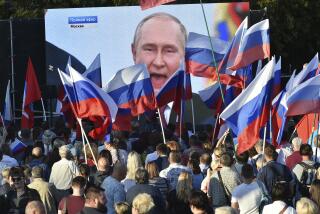Our ‘Pat on the Head’ Sank Gorbachev : Who lost the Soviet Union? Parsimony in the Bush Administration played a part.
- Share via
Mikhail S. Gorbachev has had his moment in history, and we must hope that what follows will be as useful to the West and the world as he proved to be. If so, it will not be because the United States did its part. In fact, the Bush Administration has neglected its own duty to history.
What Gorbachev did for his country will be a long time in judging. Any lasting verdict must await the outcome of its latest time of troubles. But what he did to make the world a safer place is already evident. He did nothing less than help make possible the end of the superpower nuclear age, the risk that the United States and the Soviet Union would fight mankind’s final war.
Gorbachev’s legacy includes what was arguably the most profound strategic retreat in peacetime history--from Central and Eastern Europe, from the Middle East, from all of the Soviet overseas empire except Cuba, now rotting on the vine. In exchange, he sought the Western world’s help in making glasnost and perestroika succeed. These were his great insights: that power and influence abroad mattered little if his domestic economy failed, and that renouncing empire could provide critical access to the global economy.
In Round 1, George Bush responded wisely and properly. At the Malta summit in 1989, he gave his blessing to Soviet economic relations with the West. But Bush flunked Round 2, when the question became whether the West would provide tangible support for the Soviet economic experiment.
The critical moment was the economic summit last month. Gorbachev went to London expecting some recompense for his support of U.S. global objectives. Beyond the dismantling of the Soviet European empire, most dramatic was Gorbachev’s acquiescence in--nay, his endorsement of--the U.S. military pummeling of Iraq, a Soviet client. The proof therein of the superiority of U.S. weaponry was a humiliation for the Soviet army that no doubt hastened Gorbachev’s political demise.
The penny-wise President led the effort to send the Soviet leader home from London empty-handed. Of course, there was logic: The West cannot do for the Soviet Union economically what it cannot do for itself. Workfare, not welfare, is a sensible course, rewarding progress toward change. Politically, however, Gorbachev was left with nothing to show his enemies for all his efforts in furtherance of Western strategic goals. A presidential pat on the head, represented by Bush’s state visit to Moscow, was no substitute, and Gorbachev’s ouster became inevitable.
Perhaps all will now go right in the Soviet Union. At least in the advance of human freedoms, that seems less likely than before. The hard-liners have not taken over just to change management but to change direction, and it appears that there will be another attempt to patch up communism, with potentially fearful consequences for the country.
The Moscow coup reminds us that the future of the Soviet Union has immense and unrivaled implications for us, and that its nearest Western neighbors remain acutely vulnerable, if only to their own fears and a flood of Soviet refugees.
These Central and East European countries are engaged in their own struggle to create successful post-communist societies, and the importance to us of their freedom and independence has been underscored by the reactionary developments in the Soviet Union. Here, the United States has a chance to play a critical role economically as well as politically; and here, too, the Bush Administration has failed to lead or even to be deeply engaged, its indolence and parsimony at variance with historic necessity.
The postwar era in Europe that has just drawn to a close was not created by accident but by wisdom, courage and leadership--which the United States provided in abundance. President Bush must show that he understands today’s stakes for Europe and the world, and act accordingly.
More to Read
Sign up for Essential California
The most important California stories and recommendations in your inbox every morning.
You may occasionally receive promotional content from the Los Angeles Times.










